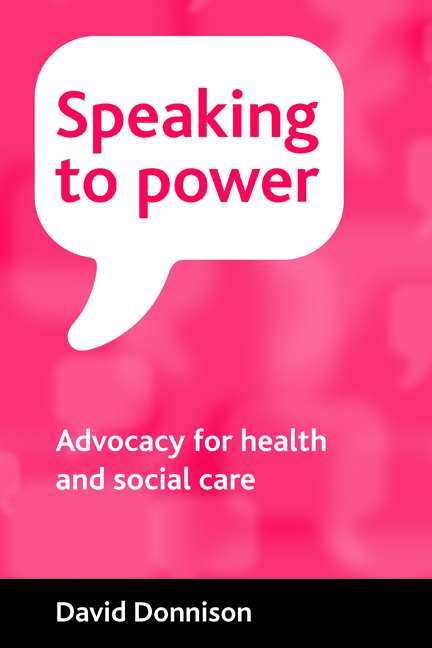Book contents
- Frontmatter
- Dedication
- Contents
- Why and how we wrote this book
- Introduction
- one Origins of advocacy
- two Scotland gives a lead
- three What advocates do: their main clients
- four What advocates do: questions and dilemmas
- five Groups and communities
- six Setting up an advocacy project and running it
- seven Volunteers
- eight Making advocacy accountable
- nine Roadblocks
- ten Looking ahead
- Further reading
- Index
four - What advocates do: questions and dilemmas
Published online by Cambridge University Press: 05 July 2022
- Frontmatter
- Dedication
- Contents
- Why and how we wrote this book
- Introduction
- one Origins of advocacy
- two Scotland gives a lead
- three What advocates do: their main clients
- four What advocates do: questions and dilemmas
- five Groups and communities
- six Setting up an advocacy project and running it
- seven Volunteers
- eight Making advocacy accountable
- nine Roadblocks
- ten Looking ahead
- Further reading
- Index
Summary
In this chapter we deal with questions that pose dilemmas for advocates – the kinds of dilemmas that it may be helpful to talk over with colleagues. In a book that will, we hope, be read by people preparing to work in this field it is important to present such dilemmas – not just the easy victories. Our discussion of each is designed to help the reader think about the puzzles involved, not to provide authoritative solutions to them. Dilemmas, by definition, do not have clear-cut solutions that everyone will agree about. Meanwhile, readers should bear in mind that the cases discussed here are not a typical cross-section of advocacy work. They are meant to be rather difficult, which also means they do not show the welfare state at its best.
People with fantasies and ‘mad’ ideas
Advocates have to listen with respect to their clients’ stories and concerns. They know they are dealing with people who may have a lot of fantasy in their lives. But this is their reality and, even if some of it is fantasy, this may be what keeps them going in bad times. This was recognised by the psychiatrist in the play Equus who envied the passion of the boy, his very disturbed patient, who had a love affair with the great horses in the stable where he worked – a love affair that gave to his life a meaning that was lacking in the psychiatrist's own life. But what if fantasy leads in destructive directions – as it did in terrifying fashion in that play – or simply into fruitless and frustrating dead ends?
How about a man who sought an advocate's help because, living on meagre social benefits, he was determined to buy a house in Spain? The advocate will have to decide when a comforting dream about a castle in Spain reaches a point where it becomes necessary to confront his client with reality. Just to collude in a fantasy is not a respectful way to treat people.
Another advocate was asked to help a young man who, though plainly unable to handle a car, was obsessed with the idea of driving a formula one racer, and exhausted everyone around him by mimicking the sound of roaring engines all day.
- Type
- Chapter
- Information
- Speaking to PowerAdvocacy for Health and Social Care, pp. 69 - 88Publisher: Bristol University PressPrint publication year: 2009



